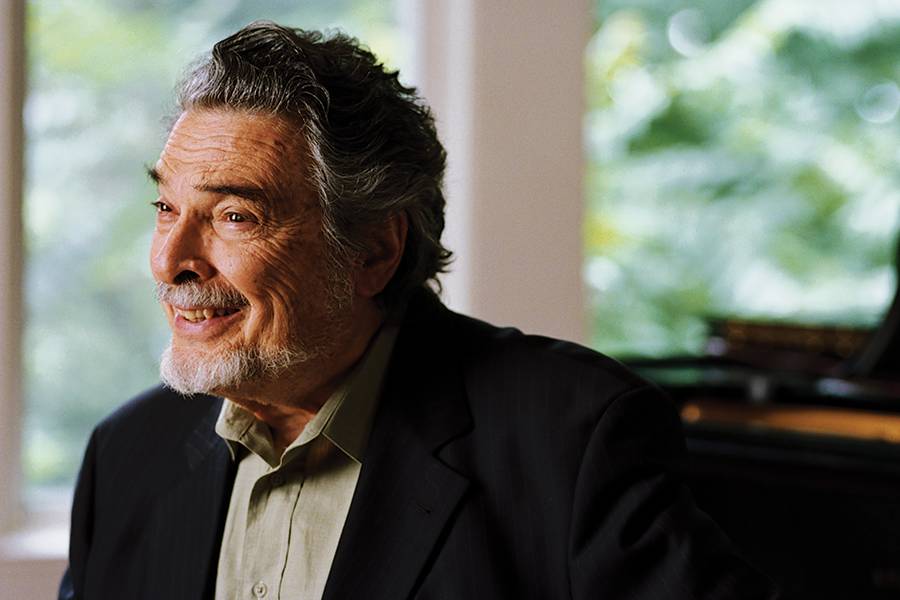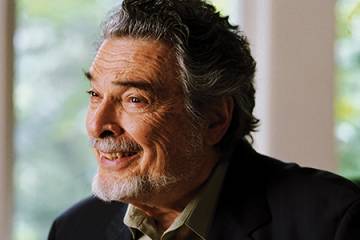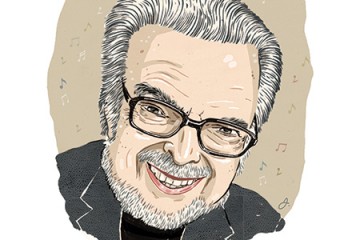Renowned American pianist Leon Fleisher, who taught piano at the Peabody Institute of Johns Hopkins University for more than 60 years, died Sunday at a hospice in Baltimore. He was 92.
"With the passing of Leon Fleisher, the music world has lost one of its towering figures," says Peabody Dean Fred Bronstein. "Our hearts go out to Leon's wife, Katherine [Jacobson], and his family and loved ones. For members of the Peabody family, it is a deeply personal loss. The name of Leon Fleisher has been synonymous with the Peabody Institute for more than six decades, his home since 1959. Leon's remarkable gifts as a musician, pianist, and teacher were matched only by his charm, wit, intelligence, and warmth as a human being."
Born in 1928 in San Francisco, Fleisher began studying piano at age 4. A musical prodigy, he was invited to study classical piano with Artur Schnabel at age 9 and at 16, he performed Brahms' Piano Concerto No. 1 in D minor with the New York Philharmonic under conductor Pierre Monteux. In a review of that debut performance at Carnegie Hall, critic Noel Strauss wrote that the young Fleisher "scored heavily in the exacting work and at once established himself as one of the most remarkably gifted of the younger generation of American keyboard artists," according to The New York Times.
Image caption: Fleisher received an honorary degree from Johns Hopkins in 2015. During the ceremony, he gave advice to the new graduates.
In the 1950s, Fleisher created seminal recordings of works by Brahms, Beethoven, Mozart, Grieg, Schumann, and Rachmaninoff. In 1952, he was the first American to win the prestigious Queen Elisabeth of Belgium Competition, performing with such bravado that he broke two piano strings during the finale. He performed publicly with world-class symphonies and privately for dignitaries and heads of state. In 1958, he represented the United States during the Brussels World's Fair. He joined the faculty of the Peabody Conservatory in 1959.
Also see
Tragedy struck in the early 1960s, when Fleisher began experiencing what he called a "creeping numbness" in his right hand and a loss of function in his right index finger. He was diagnosed with focal dystonia, a neurological condition that affected the muscles of his right hand, causing them to curl inward toward his palm. What followed was a period of despair so deep that at times he considered suicide, he later revealed.
While searching for a cure for his condition, Fleisher channeled his creative efforts into mastering the left-handed repertoire, including works by Ravel, Prokofiev, and Paul Wittgenstein, who lost his right arm in World War I. He also renewed his dedication to conducting and instruction. At Peabody, where he was appointed the Andrew W. Mellon Chair of piano, he carried on a tradition of classical pedagogy descending directly from Beethoven and handed down generationally through Carl Czerny, Theodor Leschititsky, and Fleisher's own teacher, Artur Schnabel. He became music director of the Annapolis Symphony Orchestra in 1970 and associate conductor of the Baltimore Symphony Orchestra in 1973.

Image caption: Fleisher conducts the Peabody Symphony Orchestra, c. 1990
In the 1990s, through a combination of deep massage and Botox injections, Fleisher was able to regain sufficient use of his right hand, enabling him to resume playing piano with both hands. What followed was a career renaissance of performances and recordings.
In 2003, Fleisher formed the Fleisher-Jacobson Duo with his wife, also a pianist and Peabody faculty member. Together they gave concerts worldwide and recorded for Sony Classical. Fleisher released a solo album, Two Hands, in 2004, which went on to hold a Top 5 Billboard Chart position and was celebrated by critics as one of the best recordings of the year. In 2006, he received the honor of Commander in the Order of Arts and Letters by the Minister of Culture of the French government. That same year, a documentary about his experience with focal dystonia directed by Nathaniel Kahn was nominated for an Academy Award for best short documentary. Fleisher received the 2007 Kennedy Center Honors, with the center's chairman Stephen A. Schwarzman describing him as "a consummate musician whose career is a moving testament to the life-affirming power of art." Once again, Fleisher was celebrated for his tour-de-force performances. "If Bach had a modern piano, this is how he'd play it," wrote critic Harvey Steiman, according to The Baltimore Sun.
Fleisher's memoir, My Nine Lives, co-written with music critic Anne Midgette, was published in November 2010, the same year he was named Instrumentalist of the Year by London's Royal Philharmonic Society.
Throughout his career, Fleisher taught students at the Peabody Conservatory and around the world, maintaining an international schedule of master classes, performances, and orchestral guest conducting into his early 90s, reportedly teaching and conducting master classes as recently as last week, according to The New York Times. Generations of his students have said that his guidance and mentorship has informed not only their playing, but their relationship to the world.
"I loved studying with him, and I hope I was appreciative at the time because he gave me hundreds and hundreds of hours out of his private life," pianist André Watts, who studied with Fleisher in the 1960s, told the Peabody Post in 2018. "But it was only after I left from studying with Leon, when I started to teach, that I realized to what degree he gave thought and care to teaching me."
In 2012, Fleisher donated his concert and master class programs, press material, correspondence, itineraries, photographs, clippings, personal papers, and memorabilia to the Peabody Archives. More than 1,000 of these items have been digitized and are available online through the Fleisher digital collection.
"It seems simplistic to say that there was no one else like Leon," Bronstein said. "But that is the essence of it. We were extremely fortunate to have had this man in our midst for so many years. His impact here is profound and lasting, and his absence will be felt keenly throughout the Peabody community. We have lost a giant."
Fleisher is survived by Jacobson, his wife; his children Deborah, Leah, Richard, Paula, and Julian; and two grandchildren.
Tagged in memoriam, obituaries










